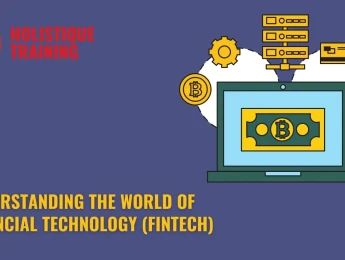- Table of Contents
- Introduction
- What Is Financial Technology (FinTech)?
- A Brief History of FinTech
- How Does FinTech Work?
- Integration of Technology and Finance
- Digital Platforms and User Interfaces
- Data Aggregation and Analysis
- Automation and Algorithmic Processing
- Secure Transaction Protocols
- Regulatory Compliance and Risk Management
- The Different Types of FinTech
- 1. Payment Processing
- 2. Peer-to-Peer (P2P) Lending
- 3. Robo-Advisory Services
- 4. Blockchain and Cryptocurrency
- 5. InsurTech
- 6. RegTech
- Why Is It Important to Use FinTech?
- Enhanced Convenience and Accessibility
- Cost Efficiency and Affordability
- Innovation and Customisation
- Streamlined Processes and Efficiency
- Financial Inclusion and Empowerment
- Disruption of Traditional Models
- How Are FinTechs Impacting Traditional Financial Services Organisations?
- 1. Competition and Market Disruption
- 2. Customer Expectations and Experience
- 3. Collaboration and Partnerships
- 4. Digital Transformation and Operational Efficiency
- 5. Regulatory Compliance and Risk Management
- FinTech Trends & New Technologies
- 1. Artificial Intelligence (AI) and Machine Learning
- 2. Open Banking and APIs
- 3. Blockchain and Distributed Ledger Technology (DLT)
- 4. Digital Identity and Biometrics
- 5. Decentralised Finance (DeFi)
- 6. RegTech and Compliance Automation
- Is FinTech Safe?
- Skills & Certificates You Need to Learn FinTech
- 1. Technical Proficiency
- 2. Financial Acumen
- 3. Certifications
- 4. Continuous Learning
- Conclusion
Introduction
Financial technology, often abbreviated as FinTech, has emerged as a transformative force reshaping the landscape of financial services. It represents the fusion of finance and technology, leveraging innovations to enhance efficiency, accessibility, and security in the realm of financial transactions. In this comprehensive guide, we delve into the essence of FinTech, its historical evolution, operational mechanisms, diverse types, significance, impacts on traditional financial services firms, emerging trends, safety considerations, and avenues for learning.
What Is Financial Technology (FinTech)?
At its core, FinTech refers to a broad spectrum of technological innovations aimed at revolutionising financial services. It encompasses many applications, including mobile payment systems, peer-to-peer lending platforms, robo-advisors, blockchain technology, cryptocurrency, and algorithmic trading, among others. FinTech solutions leverage cutting-edge technologies to streamline processes, enhance user experiences, and foster financial inclusion across diverse demographics.
A Brief History of FinTech
The roots of FinTech trace back to the late 20th century with the advent of electronic trading platforms and the proliferation of Internet banking services. However, it wasn't until the early 21st century that FinTech gained substantial momentum, propelled by advancements in mobile technology, cloud computing, and data analytics. The emergence of startups and venture capital funding further catalysed the growth of FinTech, ushering in an era of unprecedented innovation and disruption within the financial services sector.
How Does FinTech Work?
Understanding how FinTech works involves delving into the intricate interplay between finance and technology and the underlying mechanisms that power FinTech solutions across various financial services domains. Here's a detailed exploration of how FinTech operates:
Integration of Technology and Finance
FinTech leverages technology to optimise financial processes, enhance user experiences, and drive innovation within the financial services industry. By harnessing advancements in areas such as artificial intelligence, blockchain, cloud computing, and data analytics, FinTech companies develop cutting-edge solutions tailored to meet the evolving needs of consumers, businesses, and financial institutions.
Digital Platforms and User Interfaces
At the heart of FinTech are digital platforms and user interfaces that facilitate seamless interactions and transactions between users and financial services providers. These platforms encompass a wide range of applications, including mobile banking apps, online payment gateways, investment portals, and digital wallets, among others. Through intuitive user interfaces and personalised experiences, FinTech platforms empower users to access financial services anytime, anywhere, and from any device, thereby eliminating the constraints of traditional brick-and-mortar banking.
Data Aggregation and Analysis
FinTech relies heavily on data aggregation and analysis to derive actionable insights, drive informed decision-making, and personalise financial services offerings. By collecting and analysing vast amounts of data generated by user interactions, transaction histories, and market trends, FinTech companies gain valuable intelligence into consumer behaviours, preferences, and risk profiles. This data-driven approach enables FinTech firms to tailor their products and services to meet individual users' unique needs and preferences, thereby enhancing customer satisfaction and loyalty.
Automation and Algorithmic Processing
Automation lies at the core of FinTech operations, enabling streamlined processes, reduced operational costs, and improved efficiency across various facets of financial services. Using algorithms, machine learning models, and robotic process automation (RPA), FinTech companies automate routine tasks such as account management, transaction processing, credit scoring, and risk assessment. By automating repetitive tasks and workflows, FinTech solutions minimise human errors, accelerate time-to-market, and enable financial services providers to focus on value-added activities such as customer engagement and strategic decision-making.
Secure Transaction Protocols
Security is paramount in the realm of FinTech, given the sensitive nature of financial transactions and the prevalence of cyber threats in the digital age. FinTech solutions employ robust encryption protocols, multi-factor authentication mechanisms, and secure socket layer (SSL) technologies to safeguard user data, prevent unauthorised access, and mitigate fraud risks. Additionally, with its decentralised and immutable ledger system, blockchain technology offers enhanced security and transparency for transactions involving digital assets such as cryptocurrencies and smart contracts.
Regulatory Compliance and Risk Management
Compliance with regulatory requirements and risk management protocols is critical to FinTech operations, particularly in highly regulated sectors such as banking, lending, and insurance. FinTech companies adhere to stringent regulatory frameworks established by government agencies and industry watchdogs to ensure consumer protection, data privacy, and financial stability. Through robust compliance programs, regulatory reporting mechanisms, and risk mitigation strategies, FinTech firms navigate complex regulatory landscapes while maintaining the trust and confidence of their stakeholders.
In essence, FinTech is characterised by the seamless integration of technology, data-driven insights, secure transaction protocols, and regulatory compliance measures aimed at transforming the delivery of financial services and empowering users with greater control, convenience, and transparency in managing their financial affairs. As FinTech continues to evolve and innovate, its transformative impact on the financial services industry and the broader economy will be increasingly profound, shaping the future of finance in the digital age and beyond.
The Different Types of FinTech
FinTech encompasses many categories, each catering to distinct aspects of financial services. Some prominent types of FinTech include:
1. Payment Processing
Payment processing FinTech solutions facilitate seamless funds transfer between individuals, businesses, and financial institutions. These platforms leverage innovative technologies to enable secure and efficient payment transactions, including online purchases, peer-to-peer transfers, and mobile payments. Examples of payment processing FinTech companies include PayPal, Square, Stripe, and Venmo, which offer diverse payment solutions tailored to the needs of merchants, consumers, and enterprises.
2. Peer-to-Peer (P2P) Lending
Peer-to-peer lending platforms connect borrowers with individual investors, bypassing traditional banking intermediaries and offering alternative sources of financing. P2P lending FinTech companies leverage online marketplaces and algorithmic credit assessment models to match borrowers with investors based on their creditworthiness and risk profiles. Examples of P2P lending platforms include LendingClub, Prosper, Funding Circle, and SoFi, which give borrowers access to affordable loans and investors opportunities for attractive returns.
3. Robo-Advisory Services
Robo-advisory services utilise algorithms and automation to provide individual investors personalised investment advice and portfolio management solutions. These platforms leverage data analytics, machine learning, and risk assessment models to optimise investment strategies, rebalance portfolios, and minimise fees. Examples of robo-advisory FinTech companies include Betterment, Wealthfront, and Wealthsimple, which offer diversified investment portfolios, goal-based planning tools, and automated rebalancing features to help investors achieve their financial goals.
4. Blockchain and Cryptocurrency
Blockchain and cryptocurrency FinTech solutions leverage distributed ledger technology to enable secure, transparent, and decentralised transactions involving digital assets such as Bitcoin, Ethereum, and other cryptocurrencies. Blockchain platforms facilitate peer-to-peer transfers, smart contract execution, and asset tokenisation, revolutionising the concept of money and value transfer. Examples of blockchain and cryptocurrency companies include Coinbase, Binance, Gemini, and Ripple, which provide cryptocurrency exchange, trading, and custody services to individuals and institutions worldwide.
5. InsurTech
InsurTech startups leverage technology to modernise the insurance industry, streamline underwriting processes, and enhance customer experiences through digital platforms and data-driven insights. InsurTech solutions offer innovative insurance products, personalised coverage options, and claims management solutions, improving transparency and efficiency in insurance operations. Examples of InsurTech companies include Lemonade, Oscar Health, Policygenius, and Root Insurance, which utilise artificial intelligence, telematics, and behavioural analytics to disrupt traditional insurance models and empower consumers with greater choice and control.
6. RegTech
Regulatory technology, or RegTech, solutions help financial institutions automate compliance processes, monitor regulatory changes, and mitigate regulatory risks in a rapidly evolving regulatory landscape. RegTech platforms leverage data analytics, machine learning, and regulatory reporting tools to ensure adherence to regulatory requirements and standards, enhancing transparency and accountability in financial services operations. Examples of RegTech companies include Compliance.ai, Onfido, and Alloy, which provide compliance management, identity verification, and anti-money laundering (AML) solutions to financial institutions and regulatory agencies worldwide.
In summary, the diverse types of FinTech encompass a wide range of applications and functionalities, each driven by technological innovation, data-driven insights, and a commitment to enhancing efficiency, accessibility, and transparency in financial services. As FinTech continues to evolve and disrupt traditional finance models, its transformative impact will shape the future of banking, investing, insurance, and regulatory compliance, driving greater financial inclusion, empowerment, and resilience in a digital-first world.
Why Is It Important to Use FinTech?
The importance of using FinTech lies in its transformative potential to revolutionise how individuals, businesses, and financial institutions access, manage, and interact with financial services. FinTech offers many benefits that address longstanding challenges and inefficiencies within the traditional financial ecosystem. Here's why it's important to embrace FinTech:
Enhanced Convenience and Accessibility
FinTech solutions enable individuals and businesses to access financial services anytime, anywhere, and from any device with internet connectivity. Whether it's online banking, mobile payments, or digital investing, FinTech platforms offer unprecedented convenience and accessibility, eliminating the constraints of physical branch locations and traditional banking hours. This increased accessibility empowers users to manage their finances more efficiently and make real-time informed decisions.
Cost Efficiency and Affordability
FinTech disrupts traditional financial models by offering cost-effective alternatives to traditional banking services. By leveraging technology, automation, and data analytics, FinTech companies streamline processes, reduce overhead costs, and pass on savings to consumers through lower fees, competitive interest rates, and reduced transaction costs. This affordability democratises access to financial services, particularly for underserved populations and individuals with limited access to traditional banking infrastructure.
Innovation and Customisation
FinTech fosters a culture of innovation and customisation, where financial services are tailored to meet individual users' unique needs and preferences. Through data-driven insights and personalised algorithms, FinTech platforms offer customised solutions for banking, lending, investing, and insurance, empowering users with greater control over their financial affairs. This customisation enhances user experiences, fosters trust and loyalty, and promotes financial literacy and empowerment among diverse demographics.
Streamlined Processes and Efficiency
FinTech streamlines complex financial processes, automates routine tasks, and accelerates transaction processing times, thereby improving operational efficiency and reducing administrative burdens for businesses and financial institutions. Whether it's automating account reconciliation, streamlining loan origination, or optimising investment portfolios, FinTech solutions enable faster decision-making, enhanced productivity, and seamless integration across disparate systems and platforms.
Financial Inclusion and Empowerment
FinTech is pivotal in promoting financial inclusion and empowerment by expanding access to essential financial services for underserved populations, unbanked individuals, and marginalised communities worldwide. Through mobile banking, microfinance, and digital payment solutions, FinTech bridges the gap between traditional banking infrastructure and remote or underdeveloped regions, empowering individuals to participate in the formal financial system, build credit histories, and access critical financial resources for education, healthcare, and entrepreneurship.
Disruption of Traditional Models
FinTech disrupts traditional finance models by challenging the status quo, fostering competition, and driving innovation across diverse financial services industry sectors. By offering alternative funding sources, decentralised payment systems, and digital asset management solutions, FinTech reshapes the dynamics of banking, lending, and investing, compelling traditional financial institutions to adapt to changing consumer preferences and technological advancements or risk becoming obsolete in a rapidly evolving marketplace.
In summary, FinTech's importance lies in its ability to democratise access to financial services, drive innovation, enhance efficiency, and promote financial inclusion and empowerment on a global scale. By embracing FinTech, individuals, businesses, and financial institutions can unlock new opportunities, navigate economic challenges, and build a more inclusive, resilient, and sustainable financial ecosystem for future generations.
How Are FinTechs Impacting Traditional Financial Services Organisations?
FinTechs are fundamentally reshaping the landscape of traditional financial services firms, challenging conventional business models, and driving innovation across the industry. The impact of FinTechs on traditional financial services firms is multifaceted and transformative, influencing various aspects of operations, customer experiences, and competitive dynamics. Here's how FinTechs are impacting traditional financial services organisations:
1. Competition and Market Disruption
FinTechs introduce disruptive technologies and business models that challenge the dominance of traditional financial services firms. FinTechs capture market share and erode incumbents' competitive advantage by offering agile, customer-centric solutions. Traditional banks and financial institutions must adapt to the changing landscape by embracing digital transformation initiatives, enhancing service offerings, and fostering innovation to remain competitive in an increasingly crowded marketplace.
2. Customer Expectations and Experience
FinTechs prioritise user experience, simplicity, and transparency in their product offerings, setting a new standard for customer expectations in financial services. Traditional firms must reevaluate their customer engagement strategies, modernise legacy systems, and leverage data-driven insights to deliver personalised experiences that meet the evolving needs and preferences of tech-savvy consumers. Traditional financial services firms can enhance customer satisfaction and loyalty in an increasingly digital-first world by investing in digital channels, omnichannel banking, and innovative product development.
3. Collaboration and Partnerships
Recognising the value of FinTech innovation, traditional financial services firms are increasingly embracing collaboration and partnerships with FinTech startups and technology providers to drive growth, accelerate innovation, and expand market reach. Traditional firms gain access to cutting-edge technologies, fresh perspectives, and agile methodologies that complement their existing capabilities and infrastructure through strategic alliances, joint ventures, and investment initiatives. Collaboration with FinTechs enables traditional firms to tap into new markets, explore emerging opportunities, and stay ahead of industry trends.
4. Digital Transformation and Operational Efficiency
FinTechs inspire traditional financial services firms to embark on digital transformation journeys to modernise legacy systems, optimise operational processes, and improve efficiency across the organisation. By adopting cloud computing, automation, and data analytics technologies, traditional firms streamline back-office operations, reduce manual errors, and enhance scalability to meet the demands of a digital economy. Digital transformation initiatives enable traditional firms to unlock new revenue streams, reduce costs, and drive organisational agility in response to evolving market dynamics.
5. Regulatory Compliance and Risk Management
The proliferation of FinTech solutions introduces new regulatory challenges and compliance requirements for traditional financial services firms. Regulators scrutinise FinTech innovations to ensure consumer protection, data privacy, and financial stability in the digital age. Traditional firms must navigate complex regulatory landscapes, implement robust compliance programs, and adopt risk management frameworks to mitigate regulatory risks and uphold the financial system's integrity. By leveraging RegTech solutions and collaborating with regulatory authorities, traditional firms demonstrate their commitment to regulatory compliance and earn the trust of stakeholders in an increasingly regulated environment.
In summary, FinTechs are reshaping traditional financial services firms by driving competition, elevating customer experiences, fostering collaboration, enabling digital transformation, and enhancing regulatory compliance. The symbiotic relationship between FinTechs and traditional firms accelerates innovation, promotes industry resilience, and ultimately benefits consumers by expanding access to innovative financial services and driving positive change in the global financial ecosystem. As the FinTech revolution continues to unfold, traditional financial services firms must embrace change, adapt to evolving market dynamics, and leverage technology to thrive in an increasingly digital and interconnected world.
FinTech Trends & New Technologies
The landscape of FinTech is continuously evolving, driven by emerging technologies and shifting consumer preferences. Some notable trends and technologies shaping the future of FinTech include:
1. Artificial Intelligence (AI) and Machine Learning
AI and machine learning technologies are revolutionising FinTech by enabling data-driven insights, predictive analytics, and personalised customer experiences. AI-powered chatbots, virtual assistants, and robo-advisors streamline customer interactions, automate routine tasks, and provide tailored financial advice to users. Machine learning algorithms enhance fraud detection, credit scoring, and risk assessment processes, enabling financial institutions to make informed decisions and mitigate real-time risks.
2. Open Banking and APIs
Open banking initiatives and application programming interfaces (APIs) facilitate data sharing and interoperability between financial institutions, FinTech startups, and third-party developers. Open banking frameworks enable secure access to financial data and services, empowering consumers to aggregate account information, initiate payments, and access innovative financial products and services from multiple providers through integrated platforms and applications.
3. Blockchain and Distributed Ledger Technology (DLT)
Blockchain and distributed ledger technology (DLT) revolutionise financial transactions, asset tokenisation, and smart contract execution, enabling secure, transparent, and decentralised peer-to-peer transactions. Blockchain platforms facilitate cross-border payments, remittances, and trade finance, reducing transaction costs, eliminating intermediaries, and enhancing trust and transparency in financial transactions. Cryptocurrencies and stablecoins leverage blockchain technology to enable borderless, frictionless value transfer and digital asset management.
4. Digital Identity and Biometrics
Digital identity solutions and biometric authentication technologies enhance security and streamline user authentication processes in FinTech applications. Biometric authentication methods such as fingerprint recognition, facial recognition, and voice authentication provide secure and convenient access to financial services, reducing the reliance on traditional authentication methods such as passwords and PINs. Digital identity platforms leverage blockchain technology to provide tamper-proof identity verification and authentication services, enabling secure access to financial services and digital assets.
5. Decentralised Finance (DeFi)
Decentralised finance (DeFi) platforms leverage blockchain technology to enable peer-to-peer lending, borrowing, trading, and asset management without traditional intermediaries. DeFi protocols enable users to access financial services, earn interest, and participate in decentralised autonomous organisations (DAOs) using decentralised applications (dApps) and smart contracts. DeFi innovations include decentralised exchanges (DEXs), liquidity pools, yield farming, and synthetic assets, providing users with greater financial autonomy and liquidity in the digital economy.
6. RegTech and Compliance Automation
Regulatory technology (RegTech) solutions automate compliance processes, monitor regulatory changes, and ensure adherence to regulatory requirements and standards in the financial services industry. RegTech platforms leverage AI, machine learning, and natural language processing (NLP) to streamline regulatory reporting, risk management, and audit procedures, reducing compliance costs and enhancing regulatory transparency and accountability for financial institutions and regulatory authorities.
In summary, FinTech trends and new technologies drive innovation, enhance efficiency, and reshape the future of finance. By embracing emerging technologies such as AI, blockchain, and digital identity, FinTech companies and financial institutions can unlock new opportunities, improve operational processes, and deliver innovative financial products and services that meet the evolving needs of consumers and businesses in a digital-first world. As the FinTech landscape evolves, staying abreast of emerging trends and technologies is essential for industry participants to remain competitive, drive innovation, and drive positive change in the global financial ecosystem.
Is FinTech Safe?
While FinTech offers numerous benefits, data privacy, cybersecurity, and regulatory compliance concerns persist. As financial transactions increasingly migrate to digital platforms, ensuring robust security measures and regulatory compliance frameworks is paramount. FinTech companies invest heavily in encryption technologies, multi-factor authentication, and anti-fraud mechanisms to safeguard sensitive information and mitigate cybersecurity threats. Additionally, regulatory authorities play a crucial role in overseeing FinTech operations, enforcing compliance standards, and promoting consumer protection initiatives to uphold the integrity and stability of the financial system.
Challenges | Mitigation Strategies |
Security risks | Implement robust encryption and authentication. |
Regulatory compliance | Stay updated on regulatory requirements. |
Lack of consumer trust | Enhance transparency and privacy measures. |
Cybersecurity threats | Employ advanced threat detection and response. |
Technological infrastructure | Invest in scalable and resilient infrastructure. |
Table 1: The Challenges of Using FinTech & Ways to Mitigate Them
Skills & Certificates You Need to Learn FinTech
For aspiring professionals seeking to enter the dynamic field of FinTech, acquiring relevant skills and certifications is essential to navigate its complexities and unlock career opportunities. Some key areas of focus include:
1. Technical Proficiency
a. Programming Languages
Develop proficiency in programming languages such as Python, Java, JavaScript, and Solidity, which are widely used in FinTech development, data analysis, and blockchain programming.
b. Data Analytics Tools
Familiarise yourself with data analytics tools and frameworks such as SQL, R, and Pandas for data manipulation, visualisation, and statistical analysis in FinTech applications.
c. Blockchain Technology
Gain a deep understanding of blockchain technology, smart contracts, and decentralised applications (dApps) using platforms like Ethereum, Hyperledger, and Corda, which power blockchain-based FinTech solutions.
2. Financial Acumen
a. Financial Principles
To navigate the complexities of financial markets and products, one must develop a solid understanding of financial principles, including accounting, economics, corporate finance, and investment analysis.
b. Risk Management
Familiarise yourself with risk management concepts, methodologies, and frameworks such as Value-at-Risk (VaR), stress testing, and scenario analysis to assess and mitigate financial risks in FinTech applications.
c. Regulatory Compliance
Understand regulatory requirements and compliance standards governing financial services, including anti-money laundering (AML), know your customer (KYC), and data privacy regulations, to ensure regulatory compliance in FinTech operations.
3. Certifications
a. Chartered Financial Analyst (CFA)
The CFA designation is globally recognised and demonstrates expertise in investment analysis, portfolio management, and financial modelling, which are valuable skills for FinTech investment and wealth management professionals.
b. Certified Financial Planner (CFP)
The CFP certification validates expertise in financial planning, retirement planning, tax planning, and estate planning, which are essential for professionals offering personalised financial advice and wealth management services in the FinTech industry.
c. Certified Blockchain Professional (CBP)
The CBP certification validates proficiency in blockchain technology, cryptocurrency, and smart contract development, which are valuable skills for professionals working in blockchain-based FinTech applications and decentralised finance (DeFi) platforms.
d. Certified Information Systems Auditor (CISA)
The CISA certification demonstrates expertise in information systems auditing, control, and assurance, which are essential for professionals involved in cybersecurity, risk management, and compliance in FinTech organisations.
4. Continuous Learning
a. Online Courses and Tutorials
Enrol in online courses, tutorials, and educational platforms such as Coursera, Udemy, and edX to learn FinTech fundamentals, blockchain technology, data analytics, and financial modelling from industry experts and practitioners.
b. Industry Conferences and Events
Attend FinTech conferences, seminars, and workshops to stay abreast of emerging trends, technologies, and regulatory developments in the FinTech ecosystem and network with industry professionals and thought leaders.
c. Networking Opportunities
Join FinTech communities, professional organisations, and networking groups to connect with peers, share insights, and collaborate on FinTech projects, initiatives, and ventures.
Learning FinTech requires a multidisciplinary approach, combining technical proficiency, financial acumen, and regulatory compliance knowledge. By acquiring relevant skills and certifications, staying updated on emerging trends and technologies, and actively participating in the FinTech community, professionals can position themselves for success in a rapidly evolving industry that is shaping the future of finance and driving positive change on a global scale.
Conclusion
In conclusion, FinTech represents a disruptive force reshaping the future of finance, offering innovative solutions to address longstanding challenges and democratising access to financial services. By harnessing the power of technology, data, and collaboration, FinTech has the potential to drive financial inclusion, foster economic empowerment, and catalyse positive societal change on a global scale. As we embark on this transformative journey, embracing innovation, fostering collaboration, and prioritising security and regulatory compliance will be paramount to realising the full potential of FinTech in shaping a more inclusive, efficient, and resilient financial ecosystem for generations to come.
In this era of financial evolution, stay at the forefront of innovation with our course, ‘Understanding Digital Banking Innovation and Transformation.’ Dive deep into the intricacies of digital banking, exploring cutting-edge technologies, customer-centric strategies, and regulatory nuances. Gain insights from industry experts and equip yourself with the skills to lead in the dynamic landscape of digital finance. Elevate your career, embrace the future of banking, and be a driving force in shaping the next generation of financial services. Enrol now and become a catalyst for positive change in the world of digital banking.






















